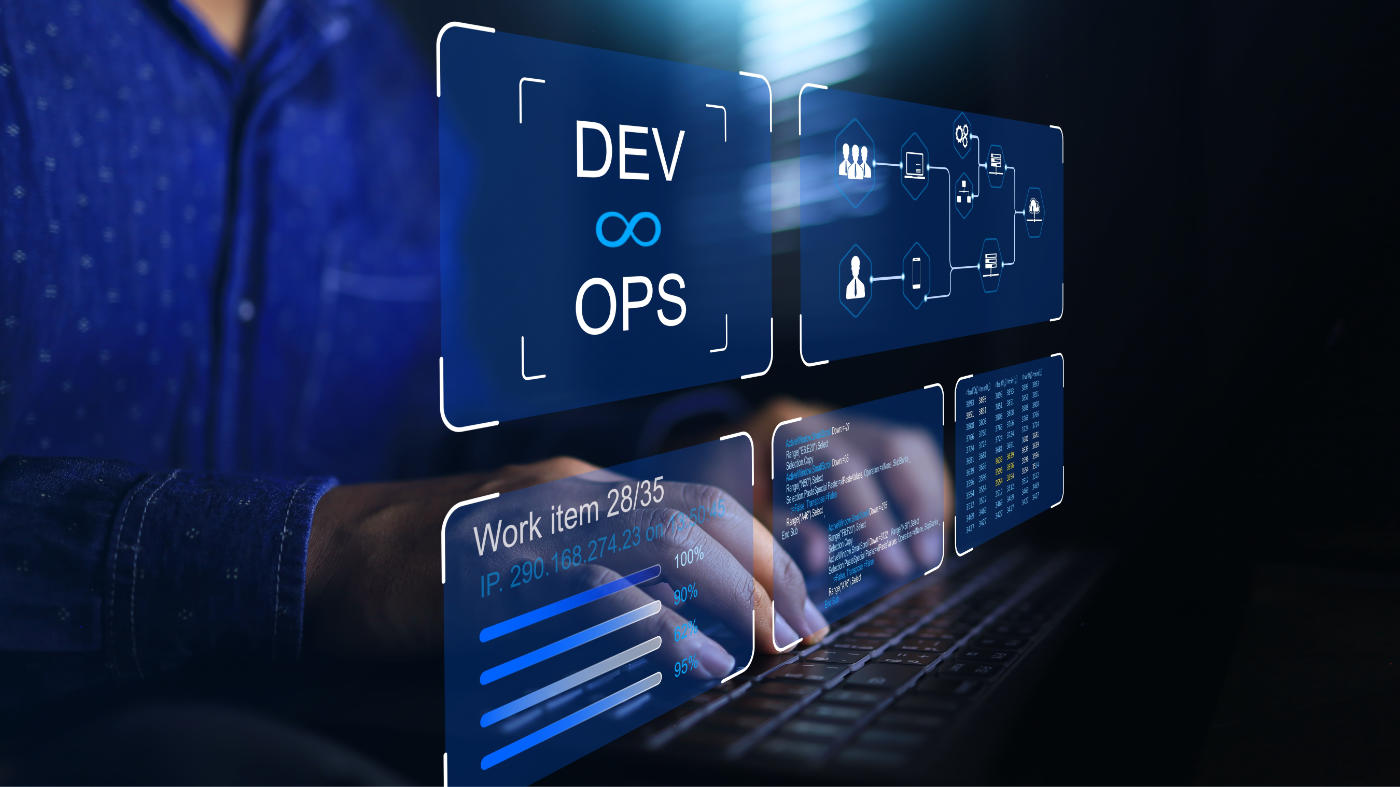DevOps Engineering
Advance your tech career with DevOps Azure, designed to equip software developers and IT professionals with in-demand skills. Learn to build CI/CD pipelines, manage Azure cloud infrastructure, implement infrastructure as code (IaC), and optimize workflows for better collaboration and system performance. Gain hands-on experience and the skills needed to thrive in the fast-paced world of DevOps.
2025 Intakes in Progress
Part-time Remote
Optimize Software Development and Deployment with DevOps
Are you ready to propel your Tech career to new heights? This DevOps Engineering course will enable you to be a skilled engineer that top companies are searching for to stay competitive in today’s fast-paced, agile industry!
You’ll master essential skills including designing and deploying infrastructure as code, building, and monitoring CI/CD pipelines, and Cloud Technologies to create scalable microservices with Kubernetes. Our engaging curriculum breaks down complex DevOps concepts into easy-to-understand lessons, ensuring you gain the knowledge and confidence needed to succeed.
Course Details
DevOps Engineering integrates software development (Dev) and IT operations (Ops) to enable organizations to deliver applications and services rapidly and reliably. By fostering collaboration among teams, automating repetitive tasks, and implementing Continuous Integration and Continuous Deployment (CI/CD), DevOps facilitates frequent and safe code changes. It also emphasizes continuous monitoring and feedback to drive improvement while treating infrastructure management as code through Infrastructure as Code (IaC) for consistency and scalability. Overall, DevOps helps organizations deliver better software faster, respond quickly to market demands, and enhance customer satisfaction.
This course is ideal for individuals who have a background in software development, IT, and deployment and want to advance their careers in DevOps roles.
- Must have fundamental knowledge of core software development principles.
- Must have a basic understanding or proficiency with command-line tools and Linux operating system environments
- Be proficient in English
- Have a laptop with the following specs – 8GB RAM, 500GB and above, Core i5 or i7.
- Access to a stable internet.
- High Demand for Skilled Professionals: As organizations increasingly adopt DevOps practices to enhance efficiency and agility, there is a growing demand for skilled DevOps engineers.
- Improved Collaboration and Efficiency: Learning DevOps enables you to implement practices that streamline workflows, reduce silos, and enhance overall productivity.
- Continuous Learning and Innovation: The DevOps landscape is constantly evolving with new tools and methodologies.
- Better Software Quality and Faster Delivery: DevOps practices, such as Continuous Integration and Continuous Deployment (CI/CD), enable teams to deliver high-quality software more rapidly. By learning DevOps, you can contribute to creating efficient development cycles and improved software reliability.
If you are in search of a unique learning experience this is the place for you. We guarantee you will learn market-aligned skills through our practical and comprehensive curriculum.
- Practical hands-on learning
- Work on a portfolio of DevOps Engineering projects
- Live Lectures from a Senior DevOps Engineer with experience working in both local & global tech companies
- Dedicated Technical mentor support
- Access to a vast alumni network
Enhance your skill set and transform your career! Take the first step toward becoming a sought-after DevOps engineer!
Get Started - Apply NowCurriculum Overview
Azure Cloud fundamentals & Azure Web Applications deployment (services):
- Core Concepts Of Azure
- Regions and availability zones (Cloud Resource Management)
- Azure Terminal (CLI and Portal) & Application Services (Plans)
- Configuring, scaling and logging applications on Azure Cloud
- Managing Images (creating docker files, Building Images, running containers)
- Develop, Test & Deploy an Azure Function
- Evaluate Azure services for integration and process automation scenarios
- How Azure Functions enable the creation of event-driven, compute-on-demand systems that can be triggered by various external events.
- Implement the publish-subscribe pattern in the cloud using Azure Queue storage
- Use Azure Service Bus topics and queues in a distributed architecture to ensure reliable communications
- Connect sending and receiving applications with Event Hubs so you can handle extremely high loads without losing data
- The basics of storage management in Azure and modelling
- Exploring Azure Storage Accounts (availability, models, types and tiers)
- Azure Blob Resource configuration (Blobs and containers)
- Azure NoSQL and Cosmos DB (Using Azure CLI to Provision)
- Managing Container Images in Azure Container Registry
- Managing Images in ACR Using the Docker CLI
- Creating Azure Container Instances (ACI)
- Azure Container Apps Architecture
- Creating and Managing ACA
- Configuring health probes and App secrets
- Learn how to create, configure, and manage virtual machines on Linux and Windows that host web apps
- Create and manage a virtual machine. Work with Windows virtual machines in Azure
- Build a run a web application with the MEAN stack
- Create and manage a Linux virtual machine
- Use Azure RBAC to manage access to resources in Azure
- Use access keys to secure networks
- Set up policies to protect cloud-based data (Conditional access)
- Secure web applications on Azure (MS Graph, Shared Access Signature (SAS)
- Provisioning and configuring Web APIS [APIM], Networking
- Error handling in API Management || Using advanced Policies
- Debug your APIs using request tracing
- Use Azure RBAC to manage access to resources in Azure
- Use access keys to secure networks
- Set up policies to protect cloud-based data (Conditional access)
- Secure web applications on Azure (MS Graph, Shared Access Signature (SAS)
- Provisioning and configuring Web APIS [APIM], Networking
- Error handling in API Management || Using Advanced Policies
- Debug your APIs using request tracing
Develop message-based solutions
- Implement solutions that use Azure Service Bus
- Implement solutions that use Azure Queue Storage
- Provisioning Azure Relay
Integrating Caching and Content Delivery within Solutions
- Implementing Basic Operations with Cached Data
- Manipulating Data in Azure Cache from the Console
Monitoring and Evaluating
- Monitoring and Logging Solutions in Azure
- Analyzing Performance Issues with Azure Monitor
- Application insights
- Instrumenting Code to Use Application Insights
If you are looking to upskill, our course will empower you to bridge the gap between technology and business.
Career Opportunities in DevOps Engineering
- DevOps Engineer
- Site Reliability Engineer (SRE)
- CI/CD Engineer
- Infrastructure Engineer
- Cloud Engineer
- Automation Engineer
- Release Manager

Focuses on implementing DevOps practices, automating processes, and enhancing collaboration between development and operations teams to streamline software delivery.

Combines software engineering and systems engineering to build and maintain scalable and reliable systems, ensuring uptime and performance.

Specializes in designing and managing CI/CD pipelines to automate the software build, testing, and deployment processes.

Responsible for designing, deploying, and maintaining the infrastructure that supports applications, often using Infrastructure as Code (IaC) tools.

Works on designing and managing cloud-based solutions, leveraging services from platforms like AWS, Azure, or Google Cloud to ensure scalability and reliability.

Focuses on automating repetitive tasks and processes in software development, testing, and deployment to enhance efficiency and reduce manual errors.

Oversees the software release process, ensuring that new features and updates are delivered smoothly and without disruptions to the user experience.


